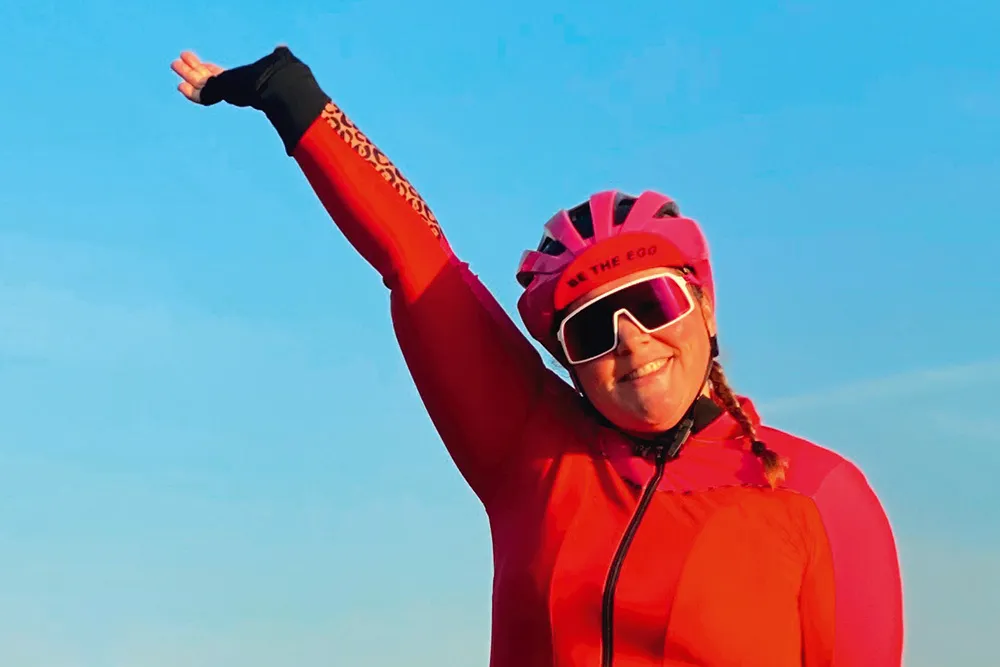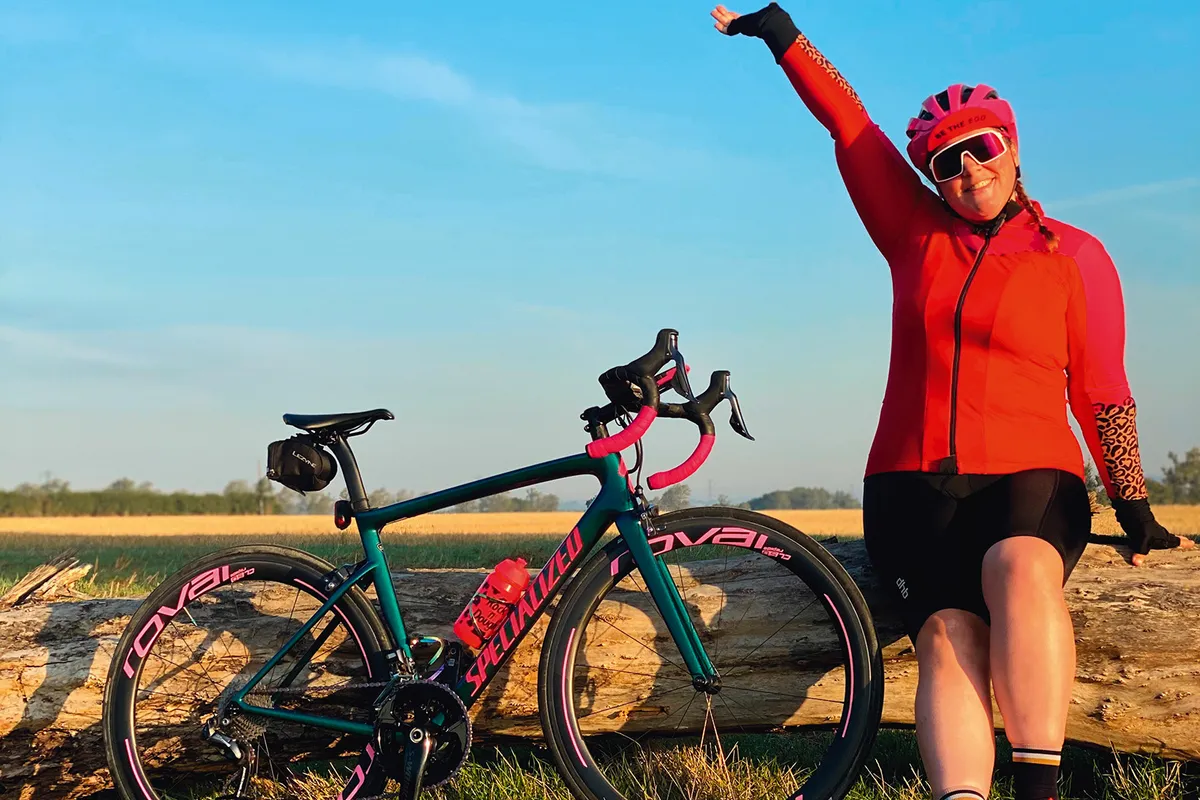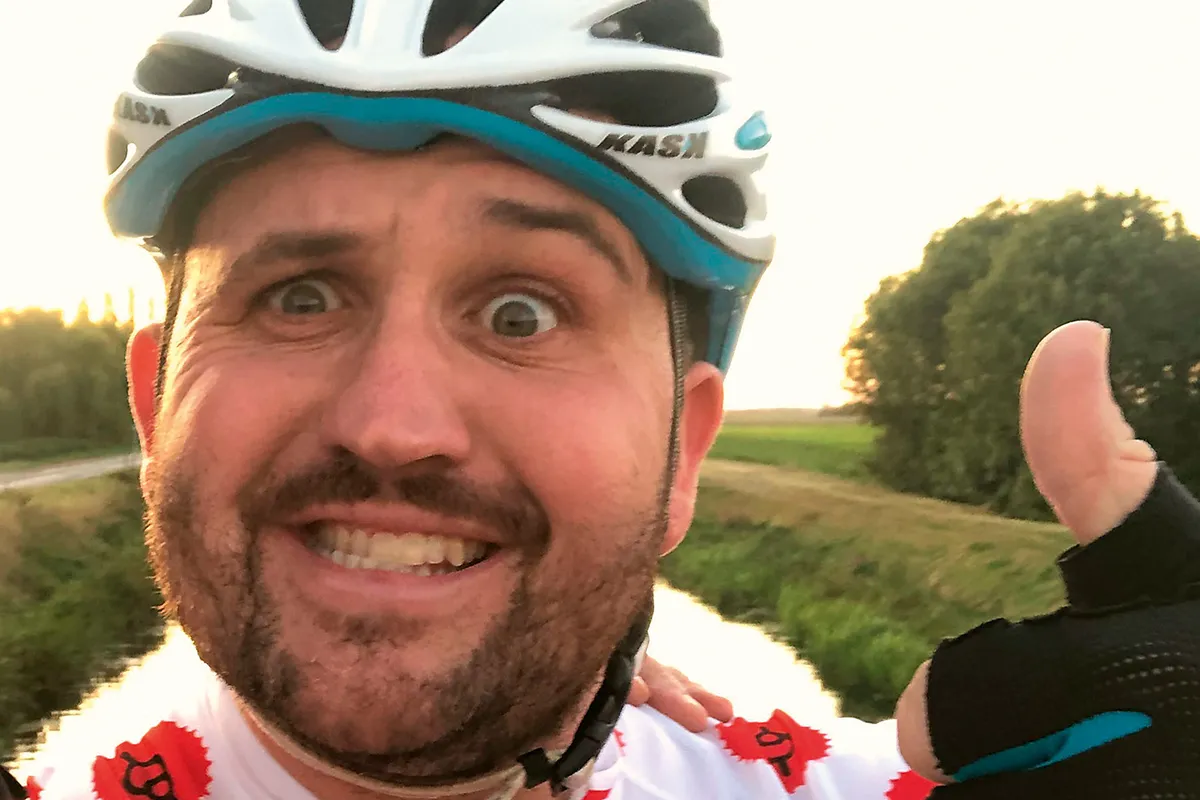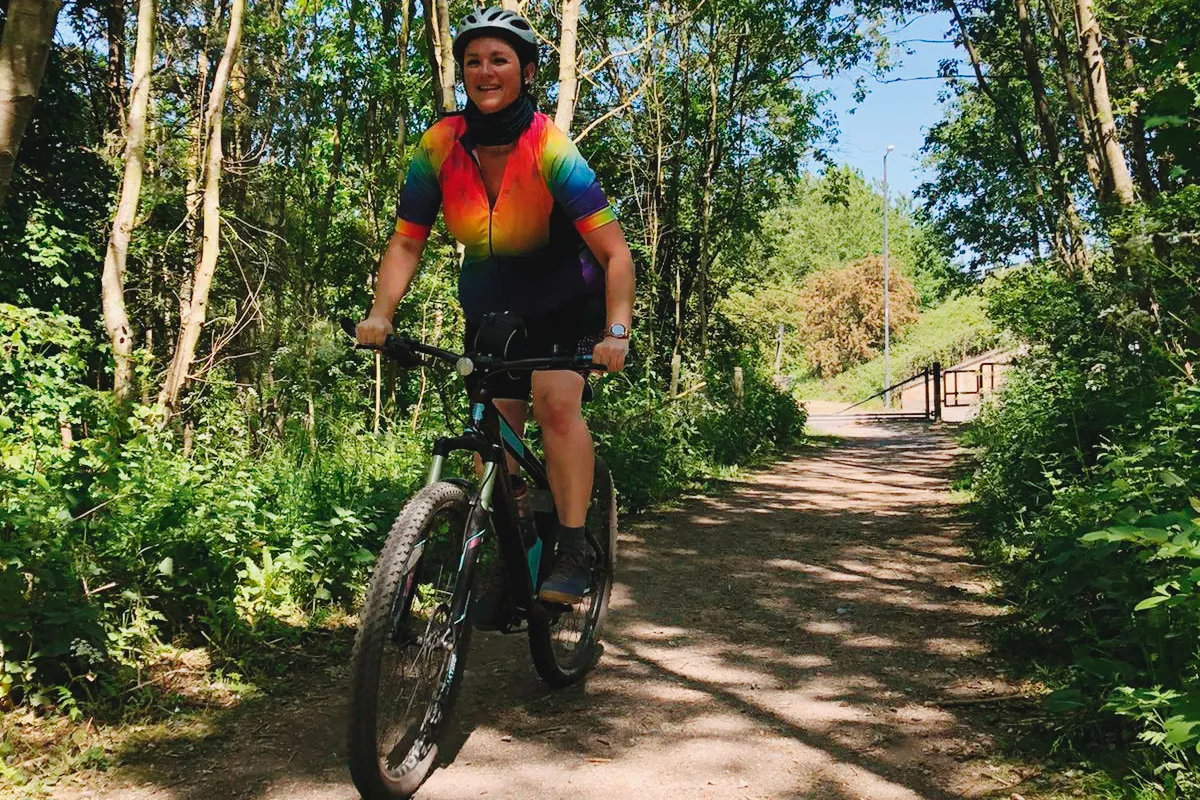From seeing spoke-thin Tour de France professionals to overhearing talk about power-to-weight ratios, road cycling can seem like an intimidating sport for heavier riders.
But as cycling is non-weight-bearing, it’s the ideal pursuit for people with a variety of body shapes and sizes, from tall people and heavy ex-rugby players to former cyclists who may have gained weight.
“Cycling is an inclusive sport,” says sports physio and bike fitter Bianca Broadbent. “There are a multitude of specialisms, from road to gravel, each with options to adopt a position that works best for your confidence, capability and shape.”
Cycling physio Nic Roberts concurs that cycling is a smart choice for athletes who may run into difficulties with other sports.
“Cycling is a great exercise compared to running, as there are less forces going through the joints, particularly if you have had knee, ankle or back problems,” she explains.
Weight and body image are highly sensitive issues. But with 67 per cent of British men and 60 per cent of British women now classed as overweight or obese, putting them at greater risk of heart disease, diabetes and certain forms of cancer, it’s a serious subject to confront.
Let’s start by exploding the myth that all road cyclists are super-lean.
“The number of skinny riders is actually a small percentage of the people who go and ride at weekends,” explains Richard Bye, founder of the Fat Lad at the Back cycle clothing range, who lost 31kg through cycling.
“Cycling is just a normal sport for normal people,” he adds
We asked four riders to explain how they turned weight gain into weight loss with the help of two wheels, as well as a healthy dose of determination.
Lisa Thake

“My blog is called Fat Girl Fit, so I’m not shy about talking about weight. When I started my blog, my focus was weight loss. I didn’t enjoy the gym, but then my husband got me into cycling.
"When he and his group were at events, I would rock up as the one-woman cheerleader. I just thought: ‘Why don’t I give it a go?’
“I ended up loving it. It has become the norm to go out riding at weekends. We’re based in London, but we get out to lots of country lanes and do loops out to the Epping Forest area.
"I have done training camps at Club La Santa in Lanzarote, which is just hills, hills and more hills, and I have done the Vätternrundan – a 300km recreational ride around Lake Vättern in Sweden.
“At first, I weighed myself every week and shared it on social media. But that approach got a bit toxic and it took the fun out of everything. I enjoyed cycling more when I just focused on trying to be healthier, rather than on losing weight.
"But I’ve lost about 25kg, just by having fun. I love going on adventures and now I can’t imagine not having cycling in my life.”
Lisa Thake's tips

1. Ride with like-minded people
“I enjoy riding in a mixed group, but some women prefer female-only rides. HSBC UK Breeze rides are good, free entry-point options for women of all abilities.”
2. Book a good bike fit
“It’s the difference between having knee pain and enjoying your rides. A quick tweak of your cleats or handlebar position is often all it takes.”
3. Saddle choice is everything
“A good bike shop will tell you which saddle you need, based on where your sit bones are, so that you feel more comfortable.”
4. Spin to win
“Hills are undeniably tough if you’re heavier, but aiming for a cadence of 80rpm makes climbing easier. In the right gear, I can maintain that cadence – even on the hills.”
Thomas Moore

“I hadn’t ridden a bike since I was young. I started piling on weight until I was about 27 stone. The initial trigger for change was that my daughter suffers with a rare heart disease, and I wanted to do something for charity, so I entered the 54-mile London to Brighton bike ride.
"On my first ride, I struggled to breathe. But I just started going out for three miles every night. My partner bought me a Garmin and when I joined Strava I really enjoyed chasing new personal goals.
“After I did London to Brighton, I got lazy again until I looked in the mirror one day and thought: ‘What the hell have you done?’ I was really big. I have kids and I need to be there for them. I was put on a milk-only diet by the doctor, which spurred me into action.
"I soon started doing 20-mile rides and getting faster and faster. I then signed up for the 100-mile Prudential RideLondon and then the Cambridge 100, which were both amazing.
“I’ve lost about 45kg. My confidence has sky-rocketed and my kids now come on bike rides with me. I’m a completely different person to who I used to be.”
Thomas Moore's tips

1. Start out small
“I didn’t have much time in the week, so I just did short 17km routes. I didn’t worry about my speeds. I just stayed in a high cadence of 90rpm to train my heart and legs ready for when I had time to go further at the weekends.”
2. Share your journey
“I post all of my tips on my Instagram page. I get loads of support.”
3. The turbo is your friend
“I started training indoors and got really into Zwift. I had never gone above 25kmh average, but on my first ride outside after using the turbo I did 27kmh.”
4. Plan your diet
“If I’m going out for a big meal one night, I will ride in the morning to burn it off beforehand, or I’ll ride the next day. It’s not a scientific rule but it’s just sensible.”
Richard Bye

“I used to cycle all the time as a kid, but after spending years travelling with work, I’d put on weight and got up to about 120kg.
“When I got back into cycling, my nickname was ‘fat lad at the back’. At that time, I just rode in T-shirts and shorts because I couldn’t find any nice kit that fitted me. I felt like a badly packed sausage.
"So I said to my wife, Lynn: ‘We should develop kit for people like me’ and we did. We called it Fat Lad at the Back. I’m a Yorkshireman: I say it like it is.
“We stock 10 to 12 sizes, which is a lot more than other cycling brands, but it’s also about the fit. Other brands don’t alter their templates as the kit goes up in size. If you’re bigger, your body carries weight in different places, and men and women don’t store fat in the same parts of the body.
"We’ve got customers in 79 countries and we have launched an unbranded Stealth range, in case you don’t like the name.
“Getting the right kit made a huge difference. It’s like buying a new set of wheels: I can’t believe how it’s made my riding so much more enjoyable. I’m now down to 89kg.”
Richard Bye's tips

1. Buy a 32-spoke wheelset
“Some wheels have a maximum rider weight of 85kg, but nobody tells you that. If you buy 32-spoke wheels, they’ll be bomb-proof, however big you are.”
2. Get more gears
“The majority of new bikes come with a 25 or 28 cassette on the back, but if you’re heavier you’ll find it much easier on the hills with a 32 cassette.”
3. Find a team
“We have a community of ‘FLAB’ [the acronym of Fat Lad at the Back] social rides and 'Flambassadors' to get people cycling. When you start out, it can feel lonely. People need a bit of support.”
4. Keep a diary
“I write down three blocks of time every week when I can ride, so I’m never thinking: ‘I’m too busy’. It’s just part of my routine.”
Carly Loscombe

“When I was tiny, I used to go cycling all the time. But in my teenage years, I started to struggle with my body image. Teenagers can be horrible and I had a nasty comment that ruined my confidence.
"I just stopped riding. I was a size 20 by the time I left school. I tried cycling again in my 30s, but I didn’t have the confidence. By 2019, I was 133kg.
“I went to see the GP and the reality hit me when I was told I needed bariatric [weight loss] surgery. I knew I had to do something. So I started doing some light walking and swimming. My husband bought me a bike and I’d often look at it longingly, but I just didn’t want to be the fat girl on the bike.
"He said: ‘Don’t see it as going out on your bike, see it as going out for an adventure. Go somewhere scenic, take some photos and show me’. And when I started doing that, I found something just clicked.
“I’m now obsessed with cycling. It’s life-saving. I have lost 57kg. It’s funny, though, because an 8km ride was just as much of an achievement to me back when I started out as an 80km ride is for me now. You always push yourself, no matter how big or thin you are.”
Carly Loscombe's tips
1. Don’t be too strict on yourself
“I started out with big weight-loss goals, but making it too regimented loses the fun. I like riding to work, but I don’t force myself to do it every day.”
2. Stay on track
“However much you ride, it’s still about calories in and calories out, so be careful. I joined a nutrition group on Facebook to help me stay on track.”
3. Ignore what other people think
“Most of the time, you think other people are looking at you, but it’s all in your head. So just enjoy your ride.”
4. Remember why you ride
“Nerves will build up again at times and that’s okay. But just remember how you felt when you got home from your first ride – and how good you will feel when you do it all over again.”
Bike, kit and training tips for larger cyclists
These tips will help you choose the right bike and kit, as well as provide guidance on how to improve your cycling and fitness over time.
What bike should I buy?
If you’re a heavier rider, choose comfort over performance to start with. “This may be a bike that puts you in a more upright position, to allow space for your hips to move freely without compression of soft tissue,” suggests physio Nic Roberts. “This could be a hybrid bike or an endurance road bike with a more relaxed geometry.”
Don’t rule out an electric bike either: “The best bike is the one that allows you to achieve your goals at any given time – and ebikes open up a new world for beginners,” adds physio Bianca Broadbent.
Whatever you choose, make sure you get a good fit. “It’s imperative that your position is functional so you can put your foot down at traffic lights and reach your brakes,” says Broadbent. “As your confidence grows, you can adapt your position.”
What kit should I wear?
When you start cycling, wear whatever you like. “If using flat pedals and wearing normal clothes is enough to get you started, that’s great,” says Broadbent. “There’s no point creating barriers. If you’re too focused on what you think you should be doing, then you will fall at the first hurdle.”
However, as you make progress, comfortable kit will undoubtedly enhance the enjoyment of your rides. “Padded bib shorts make a world of difference to comfort,” says Broadbent. “There are now some manufacturers who produce kit solely for larger clothing sizes.”
What setup is best?
Wheels have a weight limit, so aim for more spokes. “Make sure your wheels are adequate for your weight and the terrain in which you would like to go,” advises Roberts.
“Wheels with a greater spoke count are always more robust. Also choose wider tyres that can support a lower tyre pressure for a more comfortable ride.”
You’ll also want a good selection of gears for the hills. “The more gears, the better,” advises Roberts. “It will be easier on your hip and knee joints. But this is particularly important if you’re new to cycling and you need to build muscle strength to get you up the hills.”
Should I only do cycling?
No, cross-training will be particularly useful when you’re starting out in cycling by helping you to build fitness, strength and durability. “Cycling stimulates cardiovascular fitness, leg strength and core strength, but supplementary exercises can also help,” says Broadbent.
“Swimming will improve your posture and elongate your hip flexors, while Pilates or yoga will improve your flexibility.”
How should I progress my rides?
“It’s far better to ride a shorter distance regularly rather than one longer ride once a month,” advises Roberts.
“To start with, choose local, flatter loops and then start to increase the distance and add in some hills over time. Repeating the same loop can also help you to gain confidence by showing you your performance gains.”